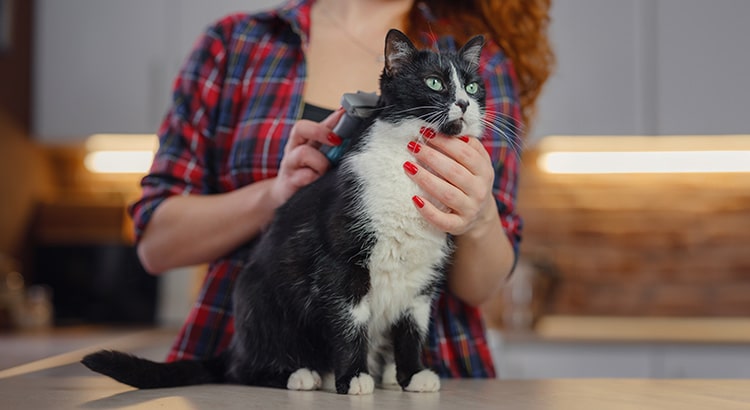
Cat hairballs are a common issue faced by many pet owners. While they may seem harmless, frequent hairballs can indicate underlying health problems in your furry friend. Understanding the causes, symptoms, and preventative measures is crucial for maintaining your cat’s well-being.
What Causes Cat Hairballs?
Hairballs occur when cats ingest lost fur during grooming. Normally, the ingested hair passes through the digestive system. However, if the hair accumulates in the stomach and cannot be digested or passed, it forms a hairball.
Symptoms of Cat Hairballs
- Persistent coughing or gagging
- Vomiting, sometimes with hairballs expelled
- Loss of appetite
- Lethargy
- Constipation or diarrhea
Preventing Cat Hairballs
- Regular Grooming: Brushing your cat regularly reduces the amount of loose hair they ingest, decreasing the likelihood of hairballs.
- Proper Diet: High-fiber cat food aids in digestion and helps hair pass through the digestive tract more smoothly.
- Hydration: Ensure your cat has access to fresh water at all times. Ample hydration can help prevent hairballs.
- Supplements: Consult your veterinarian about hairball prevention supplements or treats, which can aid in digestion and reduce hairball formation.
Managing Cat Hairballs
- Petroleum-Based Hairball Remedies: These products lubricate the digestive tract, making it easier for hairballs to pass through.
- Dietary Changes: Some specialized cat foods are formulated to reduce hairball formation by promoting healthy digestion.
- Regular Vet Check-ups: Schedule regular veterinary visits to monitor your cat’s health and address any underlying issues contributing to hairball problems.
- Homeopathic Hairball Remedies: Lubricating your pet’s digestive tract by adding a teaspoon of olive oil to your cat’s food once a week can be helpful.
Conclusion
While cat hairballs are a common occurrence, they can be managed effectively with proper care and attention. By understanding the causes, symptoms, and preventative measures, you can ensure your feline companion enjoys a happy, healthy life free from the discomfort of frequent hairballs.
Remember, a well-groomed and properly nourished cat is less likely to experience troublesome hairballs, so invest time in their care to keep them purring contentedly by your side for years to come.
Our Pin Paws Plus and Pin Paws Pet Care members have access to save on pet-centric products and services to assist with hairball management. Click here to learn more.
Table of content
Related articles

Cat hairballs are a common issue faced by many pet owners. While they may seem harmless, frequent hairballs can indicate underlying health problems in your furry friend. Understanding the causes, symptoms, and preventative measures is crucial for maintaining your cat’s well-being.
What Causes Cat Hairballs?
Hairballs occur when cats ingest lost fur during grooming. Normally, the ingested hair passes through the digestive system. However, if the hair accumulates in the stomach and cannot be digested or passed, it forms a hairball.
Symptoms of Cat Hairballs
- Persistent coughing or gagging
- Vomiting, sometimes with hairballs expelled
- Loss of appetite
- Lethargy
- Constipation or diarrhea
Preventing Cat Hairballs
- Regular Grooming: Brushing your cat regularly reduces the amount of loose hair they ingest, decreasing the likelihood of hairballs.
- Proper Diet: High-fiber cat food aids in digestion and helps hair pass through the digestive tract more smoothly.
- Hydration: Ensure your cat has access to fresh water at all times. Ample hydration can help prevent hairballs.
- Supplements: Consult your veterinarian about hairball prevention supplements or treats, which can aid in digestion and reduce hairball formation.
Managing Cat Hairballs
- Petroleum-Based Hairball Remedies: These products lubricate the digestive tract, making it easier for hairballs to pass through.
- Dietary Changes: Some specialized cat foods are formulated to reduce hairball formation by promoting healthy digestion.
- Regular Vet Check-ups: Schedule regular veterinary visits to monitor your cat’s health and address any underlying issues contributing to hairball problems.
- Homeopathic Hairball Remedies: Lubricating your pet’s digestive tract by adding a teaspoon of olive oil to your cat’s food once a week can be helpful.
Conclusion
While cat hairballs are a common occurrence, they can be managed effectively with proper care and attention. By understanding the causes, symptoms, and preventative measures, you can ensure your feline companion enjoys a happy, healthy life free from the discomfort of frequent hairballs.
Remember, a well-groomed and properly nourished cat is less likely to experience troublesome hairballs, so invest time in their care to keep them purring contentedly by your side for years to come.
Our Pin Paws Plus and Pin Paws Pet Care members have access to save on pet-centric products and services to assist with hairball management. Click here to learn more.

Cat hairballs are a common issue faced by many pet owners. While they may seem harmless, frequent hairballs can indicate underlying health problems in your furry friend. Understanding the causes, symptoms, and preventative measures is crucial for maintaining your cat’s well-being.
What Causes Cat Hairballs?
Hairballs occur when cats ingest lost fur during grooming. Normally, the ingested hair passes through the digestive system. However, if the hair accumulates in the stomach and cannot be digested or passed, it forms a hairball.
Symptoms of Cat Hairballs
- Persistent coughing or gagging
- Vomiting, sometimes with hairballs expelled
- Loss of appetite
- Lethargy
- Constipation or diarrhea
Preventing Cat Hairballs
- Regular Grooming: Brushing your cat regularly reduces the amount of loose hair they ingest, decreasing the likelihood of hairballs.
- Proper Diet: High-fiber cat food aids in digestion and helps hair pass through the digestive tract more smoothly.
- Hydration: Ensure your cat has access to fresh water at all times. Ample hydration can help prevent hairballs.
- Supplements: Consult your veterinarian about hairball prevention supplements or treats, which can aid in digestion and reduce hairball formation.
Managing Cat Hairballs
- Petroleum-Based Hairball Remedies: These products lubricate the digestive tract, making it easier for hairballs to pass through.
- Dietary Changes: Some specialized cat foods are formulated to reduce hairball formation by promoting healthy digestion.
- Regular Vet Check-ups: Schedule regular veterinary visits to monitor your cat’s health and address any underlying issues contributing to hairball problems.
- Homeopathic Hairball Remedies: Lubricating your pet’s digestive tract by adding a teaspoon of olive oil to your cat’s food once a week can be helpful.
Conclusion
While cat hairballs are a common occurrence, they can be managed effectively with proper care and attention. By understanding the causes, symptoms, and preventative measures, you can ensure your feline companion enjoys a happy, healthy life free from the discomfort of frequent hairballs.
Remember, a well-groomed and properly nourished cat is less likely to experience troublesome hairballs, so invest time in their care to keep them purring contentedly by your side for years to come.
Our Pin Paws Plus and Pin Paws Pet Care members have access to save on pet-centric products and services to assist with hairball management. Click here to learn more.



